The content of the article
- What is a court order?
- Who is issued
- Differences of the court order from the decision on the claim
- Pros and Cons of Order Production
- In which cases a court order is issued
- Issuance Procedure
- Application for initiation of writ proceedings
- For an individual
- Bank debt collection
- State duty for a debt recovery order
- Debt collection proceedings
- Appeal and annulment of a court order
- Consequences of cancellation
One common way to recover a debt is to go to court. The legislation provides a simplified form for resolving such disputes when the parties are not called to a meeting. A debt collection order is issued only on the basis of the documents submitted.
What is a court order?
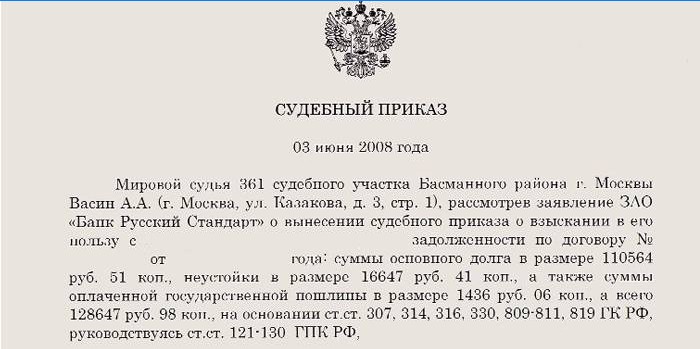
According to the Civil Procedure Code of the Russian Federation, this is a resolution on the basis of an application for the recovery of finance or property from the debtor, which is issued without hearing the arguments of the parties. This is an executive document, the basis for the beginning of the actions of bailiffs. The law establishes that the maximum amount of collection cannot exceed 500,000 rubles.
Who is issued
The document is prepared by the judge, who decides on the submitted application, after familiarization with the circumstances of the case. A court order for debt collection is intended to resolve disputes only in situations of unequivocal rightness of one of the parties. In other cases, debt issues are considered only through a lawsuit..
Differences of the court order from the decision on the claim
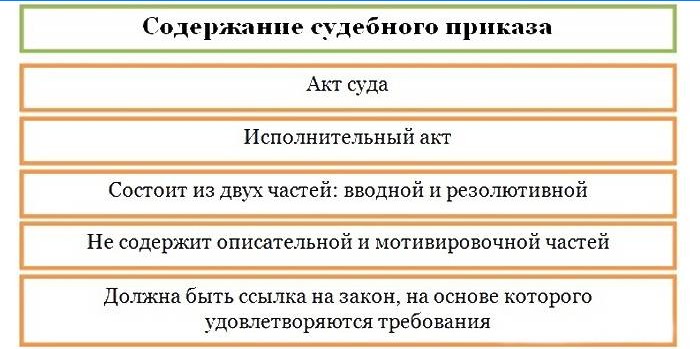
In the first case, the result will be unambiguously in favor of the recoverer, because the decision is made on the basis of indisputable documents (mortgage agreement with the bank, etc.), and the debtor is not called to court. For this reason, the process of preparing and issuing a writ of execution is much faster..
During a lawsuit, the circumstances of the case are considered and the opinions of the parties are heard, therefore it is not known from the outset whether they will satisfy or reject the demand for debt repayment.
Pros and Cons of Order Production
For the applicant:
- pros – quick guaranteed decision in his favor, when the debtor’s excuses are not taken into account.
- Minuses – repayment of only the debt itself without fines and penalties, which may amount to a significant share in the total amount.
For the debtor:
- pros – saving time due to the fact that you do not need to participate in court hearings. It is also important that the size of the penalty will not become larger during the consideration, as is the case with a traditional lawsuit.
- Minuses – lack of ability to influence the course of the process, the outcome of which will obviously not be in his favor.
In which cases a court order is issued
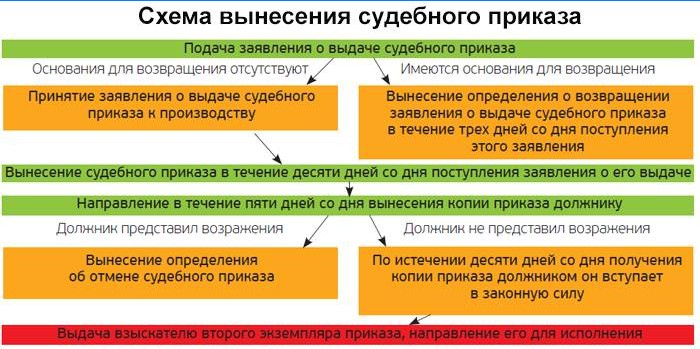
A prerequisite is the indisputability of the claims made by the applicant. This means that his claims are legal, and the debtor has no objections. For example, the company does not pay salaries, although the law requires the employer to do this. In this case, the claims are indisputable, the arguments of the organization’s management are unprincipled and the obligation must be fulfilled..
Legal situations in which a court order can be used are defined in Article 122 of the Civil Procedure Code of the Russian Federation (Code of Civil Procedure of the Russian Federation):
- Transactions certified by a notary. It does not matter whether a notarization is required by law or if it is provided for by agreement of the parties (for example, if money was loaned on receipt).
- When a notary public disputes securities (bills of exchange, acceptances, etc.).
- Collection of alimony for minor children, when there is no need to establish or dispute paternity, the claim is stated in hard cash and agreement is reached on the place of residence of the children.
- Fully or partially unpaid wages. A prerequisite – the organization’s accounting must accrue this money.
- Transactions in simple writing. The contract must have the components established by law (date and place of conclusion, due date, etc.)
- Compensation for its delay in salary, vacation pay and other amounts due to employees under the law.
- Debt on payments for the maintenance of the apartment, utilities, telephone.
- Debts on payments, membership dues in partnerships or cooperatives.
Issuance Procedure
- Filing a claim with a justice of the peace.
- Excitation of production. Having received the necessary papers (statements, loan agreement, etc.), the judge considers the circumstances of the case. A prerequisite for the commencement of legal proceedings is the payment of state duty.
- Making a decision to issue a court order. A judge may refuse in case of non-observance of formalities when applying (for example, an application for issuing an order was made in violation). After correcting these shortcomings and re-submitting documents, a court decision can be made.
Application for initiation of writ proceedings
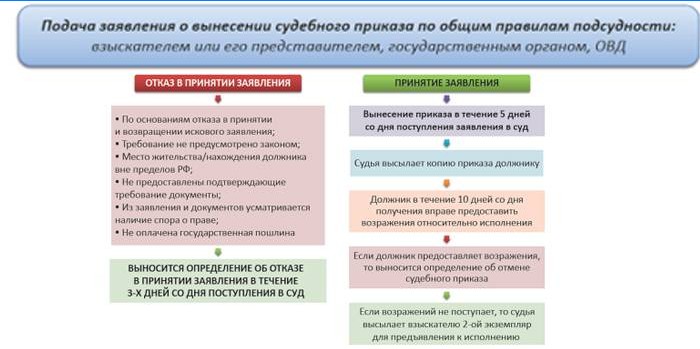
According to Article 124 of the Code of Civil Procedure of the Russian Federation there should be indicated there:
- Name of the judicial authority to which the appeal is being conducted.
- Information about the claimant and debtor.
- Specific Debt Recovery Requirements.
- Mentioning documents giving grounds for recovery.
- The value of the property (if the foreclosure is directed to him, and not to finance).
- The list of attached documentation, which should confirm the requirements of the applicant.
The statement is signed by the claimant or a person authorized to do so. If the document is submitted by the legal representative, a copy of the passport must be attached. According to the law, the submitted application is considered within 5 days.
For an individual
The peculiarity of filling out applications of this type is that it should include:
- Surname, name, patronymic of the person applying to the court.
- Date of his birth.
- Registration Address.
- Contact Information – Phone and / or Email.
Depending on the specific situation, it is necessary to attach:
- Collection of alimony – marriage certificate, birth certificate of a child.
- The transaction between citizens is the original of the contract. In cases provided for by law, it must be certified by a notary public..
- Salary issue – a copy of the work book, a certificate of unpaid funds (it must be signed by the head of the organization or chief accountant).
- Challenging a bill – a copy of this security.
Bank debt collection
If the delay in the loan is more than two months, the financial institution may apply to the court for an order to recover the debt.
The application must include:
- Full name of the credit organization.
- License number.
- Legal and actual address, contact phone numbers, last name, first name and patronymic of the responsible person.
- Details of the loan agreement.
- Information on loan conditions and amount of debt.
- Surname, name, patronymic of the debtor, registration address and contact phone number.
State duty for a debt recovery order
The fee is 50% of the established duty for claims (in the latter case, the amount is determined by Article 333.19 of the Tax Code of the Russian Federation). The amount depends on the specific requirements and the amount of debt. Collection of alimony, salary and other income of employees exempt from state duty.
Debt collection proceedings
The order is drawn up on a special form in duplicate, certified by the official stamp – for the judicial office and the applicant. A copy is sent to the debtor. If within 10 days there are no objections from it, the document shall enter into force. The deadline for submitting a court order for execution is 3 years from the date of issue. If this time is missed, but the claimant has a good reason (illness, injury, etc.), upon repeated appeal to the court, enforcement proceedings may be resumed.
Appeal and annulment of a court order
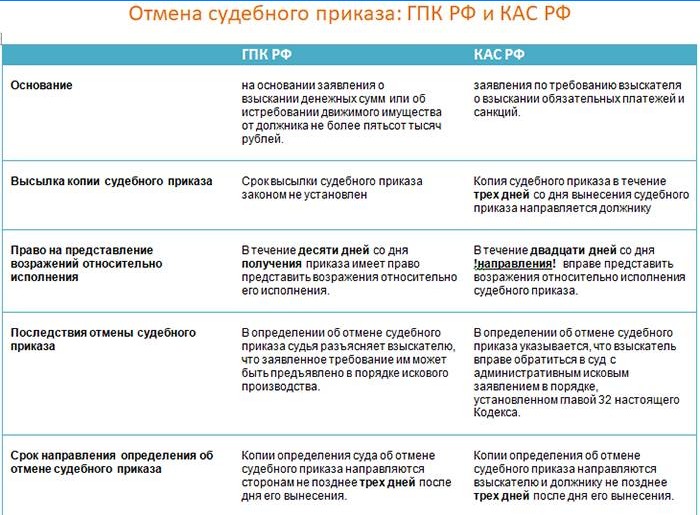
To appeal the decision on recovery, the debtor needs to file an application with an objection to the court order. If it is substantial and significant, it will be accepted as the basis for the cancellation of a prepared document.
With the consent of the court decision, the execution of the court order to collect the debt begins. Depending on the situation, the applicant or the bailiff service is involved in this..
Consequences of cancellation
In accordance with Article 129 of the Code of Civil Procedure of the Russian Federation, a judge will be required to:
- Explain to the applicant that his claim can be fulfilled only in a lawsuit. In this case, the court will hear both sides of the case and decide on the basis of their testimony..
- Send the applicant and the debtor a copy of the document on cancellation of the court order. No more than three days are allotted for this..

Can you please explain the process of a debt recovery order? How does it work and what steps are involved in obtaining one?